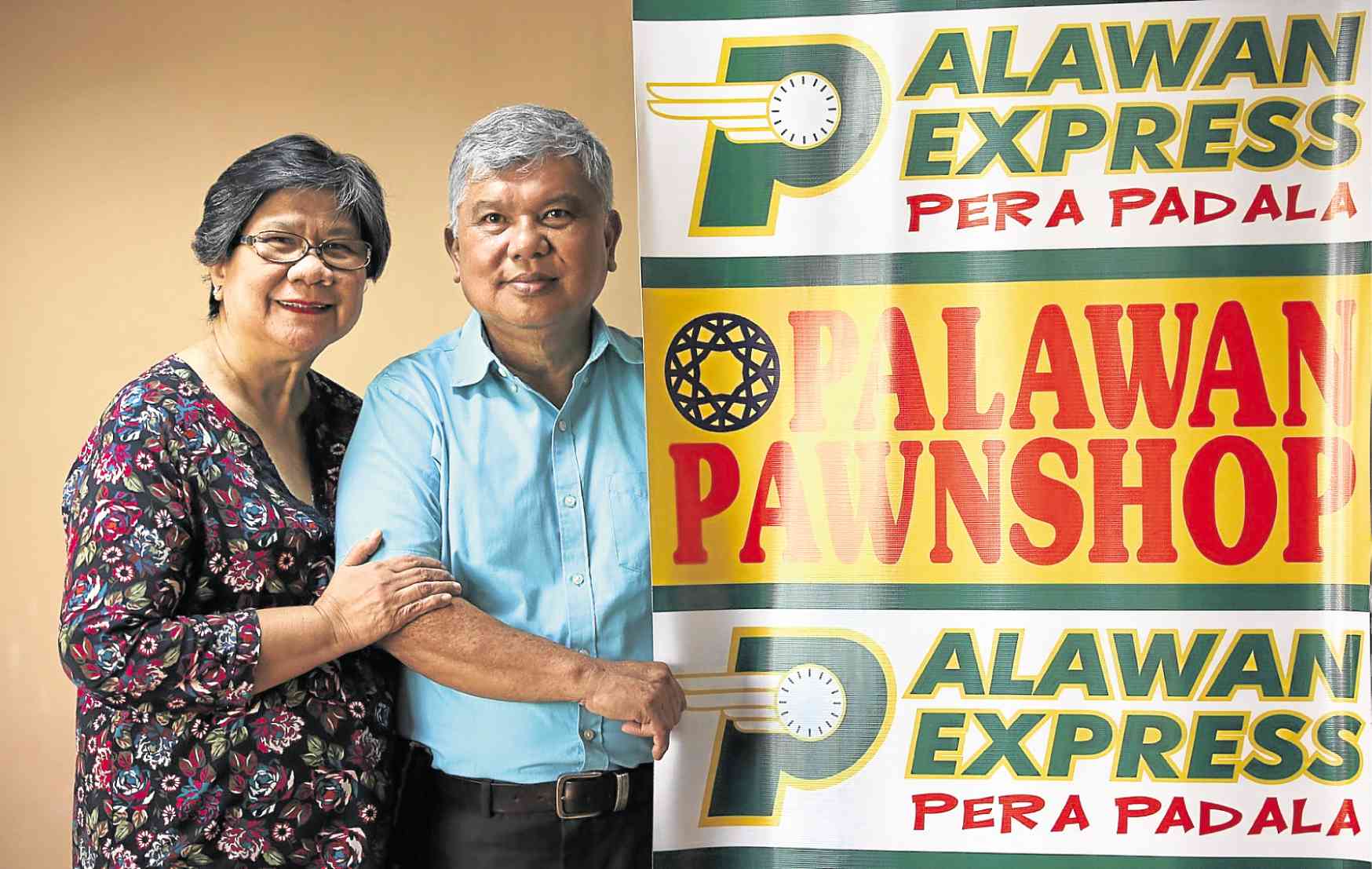
Palawan Express owner Bobby Castro with his wife, Angelita M. Castro. Both were activists during Martial Law. —LYN RILLON
Spend two hours with Bobby and Angelita Castro, the couple behind the success of Palawan Pawnshop-Palawan Express Pera Padala (PPS-PEPP), and you’ll see their company’s simple mission: to be of service to their fellow Filipinos.
It’s a passion that has been shared by the high school sweethearts since their teen years, when entrepreneurship wasn’t even on their minds, as they were fighting to free the country from the dictatorship of the late dictator Ferdinand Marcos.
“Aktibista rin ‘yan (She’s also an activist),” says Castro, referring to his wife, seated beside him, who smiles, and replies, “The first time he was arrested and imprisoned, it just so happened that I wasn’t there with him.”
During the 1970s, or what was supposed to be their college years at the University of the Philippines Diliman, the couple were involved full-time in the political movement.
Castro’s first detention, in Camp Crame, was in 1975. He was let out on a pass, but two years later, was arrested again and detained in Camp Olivas after an encounter with the military where he was shot in the head and right shoulder.
He was released a year later, and that’s when he and Angelita decided to get married and settle in Palawan, Castro’s father’s hometown.
“It’s a good thing you waited for him,” we say to Angelita, who shrugs and chuckles. Castro then interjects, “Well, she’s had a crush on me since first year high school!”
While in Puerto Princesa City, Castro’s father, a retired colonel, had a building constructed, which housed commercial spaces, a small hotel, restaurant, and a bar.
Although Castro says he and Angelita still had thoughts of returning to Manila, they realized that after being away for so long, their future was in Palawan. Castro eventually got a degree in Business Education at the Palawan Teacher’s College (now Palawan State University), while being father initially to two children, Lilian and Karlo. He and Angelita now have five kids—Korina, Lisa Lou, and Bobbit followed—all of whom are involved in running Palawan Pawnshop-Palawan Express Pera Padala.
“The nice thing about having the kids involved in the business is that we didn’t force them to do so. They all worked elsewhere, but eventually they all decided to help,” says Castro.
Palawan Pawnshop was not originally established by the Castros; they bought the business from another family, the Rodriguezes, in 1985, because Castro wanted an entrepreneurial venture of his own, aside from managing his father’s building. He had smaller pursuits, which did not last, prior to his acquisition of Palawan Pawnshop, such as selling cloth diapers, fish, and wild honey, and even opening a wood sash factory and furniture store.
In his autobiography, “An Entrepreneur’s Journey,” which Castro distributed only to family and friends, he says that Palawan Pawnshop opened a completely new chapter in his and his family’s lives—a chapter which honed Castro’s creativity as an entrepreneur, since they were, initially, small fry compared to more established pawnshop chains in the country.
From their first branch in Castro’s father’s Circon Building (named after his grandfather Ciriaco and grandmother Concepcion), Castro opened 15 more in Palawan. By 1998, they began to venture outside their province, starting with Negros Occidental. Their strategy was to open in small towns where they had no competition—and it worked.
Castro’s activist side also kicked into high gear when it came to Palawan Pawnshop’s expansion. He formed “task forces” to oversee work in the different regions, and had “cadres,” leading these groups.
“We are very aggressive when it comes to expansion. At first we avoided competition, but when we started to become more experienced in the business, we became more confident in going head-to-head with them, since we saw, too, that we were offering better products,” Castro says.
Now, PPS-PEPP has over 2,700 company-owned stores; their biggest competition, says Castro, has only around 2,500. By 2020, the company plans to cover all provinces in the country.
Their business philosophy has an acronym, explains Castro: PAFCIP. It stands for, 1) offer better Products; 2) Advertise; 3) develop store Frontliners; 4) Construct good stores; 5) offer Incentives to associates (what Castro calls his employees); and 6) offer Promos.
“The big players weren’t paying any attention to us, in the beginning, when it came to our promos. We developed loyalty cards, coupons; soon it was too late for them to catch up. We were also the first to introduce text notifications for remittances; the others didn’t have that back then,” says Castro. “Of course, we backed all that up with good products.”
Castro also took a different approach when it came to their advertisements for cash remittances, which became part of the business in 2003. While their competitors’ ads focused on the “drama” behind the service (the usual scenario: one who is working away from home sends money to loved ones in the province, which helps them live a better life), Castro said they took another route and used comedy through endorsers such as Dionisia Pacquiao.
“Mommy D embodies what Palawan Express Padala is,” says Castro. “She worked really hard to support her family, and she is such a genuine person.”
As the company continues to grow—they now have over 11,000 employees—Castro says they continue to innovate to stay ahead. Digitalization is their current focus; and in around four years, Castro says there are plans of an IPO.
As far as they’ve come, the Castros’ response when asked what most important business lesson is, is this: “Just be good, and do good. Everything will fall into place.”

